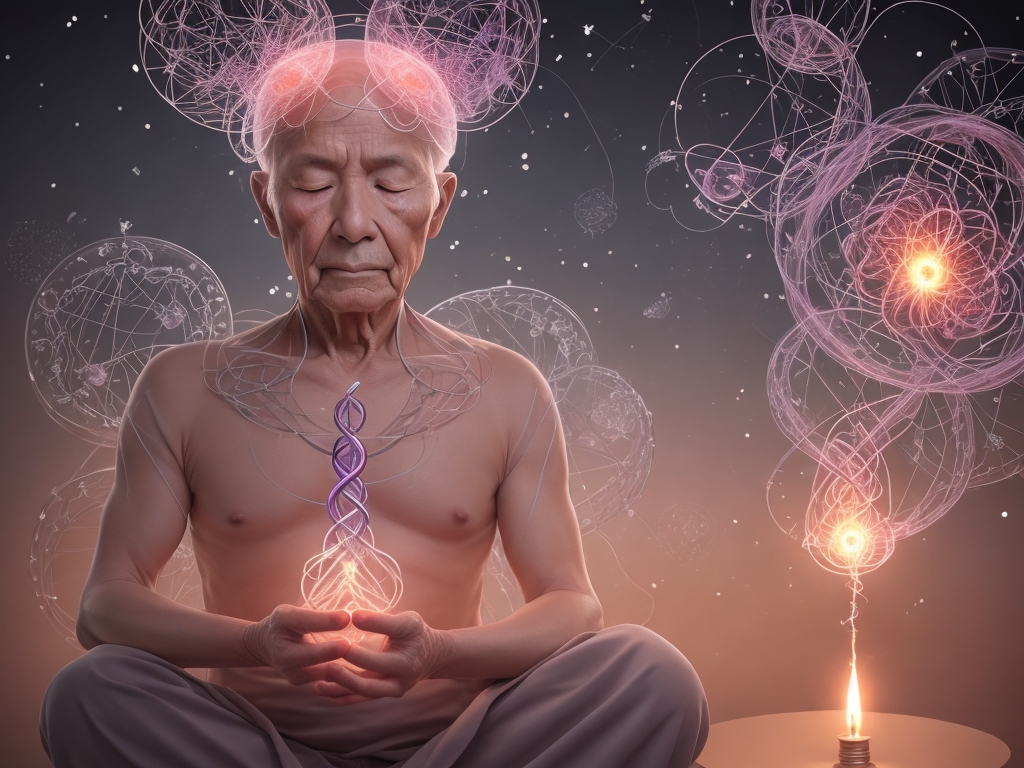10 Science Backed Health Benefits of Regular Meditation
The Timeless Journey of Meditation
Meditation, a practice as ancient as humanity itself, has been a beacon of inner peace and self-awareness for countless generations. From the campfires of our ancestors to the modern apps on our smartphones, meditation has evolved, yet its essence remains unchanged. Let’s embark on a journey to understand the roots of meditation and the surge of scientific interest in this age-old practice.
A Glimpse into the Past: Meditation’s Historical Significance
We’ve all heard of meditation, especially with the mindfulness boom in recent decades. But what truly is meditation? Stemming from the Latin term meditatum, which means “to ponder,” meditation is more than just a practice—it’s a way of understanding our minds, our feelings, and our behaviors. The history of meditation is as rich as it is diverse, with its origins tracing back to ancient civilizations and cultures. From the Latin origins of the word to the Vedic hymns that sang the universe into being, meditation has been a cornerstone of human introspection and spiritual growth.
The Scientific Renaissance: A Renewed Interest in Meditation
In recent times, the scientific community has turned its gaze towards meditation, seeking to understand its benefits and mechanisms. As researchers dive deep into the intricacies of the human mind, they’re discovering the profound impacts of meditation on our mental, emotional, and physical well-being. This renewed interest is not just about understanding meditation but also about harnessing its potential for holistic human development.
The Science Behind Meditation: A Deep Dive

Meditation, once a mystical practice reserved for monks and spiritual seekers, has now found its way into the limelight of scientific scrutiny. But what’s all the buzz about? Let’s unravel the science behind meditation and how it’s transforming our understanding of the human brain and body.
Meditation’s Magic on the Mind
Ever wondered why after a meditation session, you feel like a weight’s been lifted off your shoulders? It’s not just in your head well, technically, it is! Studies have shown that meditation can increase the thickness of the prefrontal cortex, the part of the brain responsible for decision-making and self-awareness. Moreover, it’s been observed to decrease the size of the amygdala, the brain’s “fear center.” So, in essence, meditation not only boosts our cognitive abilities but also dials down our stress levels.
The Body’s Response to Stillness
It’s not just the mind that reaps the benefits. The body, too, has its share of the meditation pie. Research methodologies, ranging from brain scans to blood tests, have revealed that meditation can reduce inflammation, enhance immune response, and even alter our DNA in a way that slows down cellular aging. Yes, you read that right! Meditation might just be the fountain of youth we’ve been searching for.
A Word on Research Methodologies
While the findings are promising, it’s essential to note the methodologies behind them. Most studies employ rigorous techniques like fMRI scans to observe brain activity and randomized controlled trials to ensure accuracy. However, as with all science, it’s a continuous journey of discovery. So, while we’ve uncovered a lot, there’s still a vast ocean of knowledge waiting to be explored.
1.Reduces Stress and Anxiety: The Power of Meditation

In today’s fast-paced world, stress and anxiety have become unwelcome companions for many. But what if there was a simple, age-old solution to these modern-day challenges? Enter meditation a practice that’s been transforming lives for millennia.
The Hormonal Harmony
Stress, in its essence, is a hormonal response. When we’re stressed, our body releases cortisol, often dubbed the “stress hormone.” While short bursts of cortisol can be beneficial, chronic stress leads to prolonged elevated levels, wreaking havoc on our body and mind. Meditation, with its calming effect, has been shown to reduce the production of cortisol. By focusing our attention away from the chaos and towards a point of calm, we essentially tell our body that it’s safe, leading to a decrease in stress hormones.
Anxiety’s Antidote
Anxiety, a close relative of stress, is characterized by excessive and persistent worry. Studies have consistently showcased that regular meditation can significantly reduce anxiety levels. One of the reasons is the shift in brain activity. Meditation promotes activity in the prefrontal cortex (responsible for rational thinking) and reduces activity in the amygdala (the fear center). Over time, this shift can lead to a more balanced emotional state, where anxiety doesn’t hold the reins.
The Evidence Speaks
While ancient wisdom has always vouched for meditation’s benefits, modern science has jumped on the bandwagon too. Research from institutions like the Mayo Clinic suggests that meditation can not only provide a sense of calm but can also benefit our emotional well-being and overall health. Furthermore, a study highlighted by the American Psychological Association found that mindfulness meditation positively changes our brain and biology, enhancing mental and physical health.
In essence, the act of meditating, of bringing oneself to the present moment, acts as a reset button for the mind. It’s a momentary pause from the incessant chatter of our thoughts, a break from the constant barrage of information. And in that pause, in that break, lies the antidote to stress and anxiety.
Enhances Concentration and Attention: Meditation’s Magic Touch

In a world filled with distractions, maintaining focus can feel like an uphill battle. But what if there was a way to sharpen our concentration and extend our attention span? Meditation, an ancient practice, might just be the answer we’ve been searching for.
The Brain’s Meditation Map
When we meditate, specific regions of our brain light up like a Christmas tree. The prefrontal cortex, responsible for attention and executive functions, becomes more active. Simultaneously, the anterior cingulate cortex, which plays a role in self-control and focus, also shows increased activity. It’s like giving your brain a workout, strengthening the muscles of concentration and attention.
From Ancient Practice to Modern Science
While meditation has been practiced for millennia, modern science has only recently begun to uncover its profound effects on the brain. Research has shown that consistent meditation can lead to increased thickness in the prefrontal cortex. This change translates to improved attention and reduced mind-wandering. In essence, meditation trains the brain to become more attentive and less prone to distractions.
Studies Speak Volumes
One groundbreaking study found that just eight weeks of mindfulness meditation led to better focus and improved memory during tasks. Another research piece highlighted that meditation could increase attention span, with some participants showing improvement after just four days of practice! It’s clear that the act of meditating, of grounding oneself in the present moment, has tangible benefits for our cognitive functions.
In today’s digital age, where distractions are just a click away, enhancing our concentration and attention is more crucial than ever. Meditation offers a natural, time-tested solution, backed by both ancient wisdom and modern science.
3.Improves Sleep Quality: Meditation’s Restful Embrace

Tossing and turning at night, counting sheep, or staring at the ceiling sound familiar? Sleep disturbances are all too common in today’s bustling world. But there’s hope on the horizon. Meditation, an ancient practice, has been making waves in the realm of sleep science. Let’s delve into how meditation intertwines with melatonin and sleep cycles to gift us a night of restful slumber.
Meditation and Melatonin: A Dreamy Duo
Melatonin, often termed the ‘sleep hormone,’ plays a pivotal role in regulating our sleep-wake cycle. The fascinating bit? Meditation can boost melatonin levels in the body. When we meditate, especially in the evening, our body’s production of melatonin gets a gentle nudge. This increase aids in faster sleep onset, deeper sleep phases, and a more refreshed awakening.
The Sleep Cycle Symphony
Our sleep isn’t just a monolithic block; it’s a series of cycles, each with its unique characteristics. Meditation, with its calming prowess, can harmonize these cycles. Regular meditators often experience more extended periods of deep, restorative sleep. This deeper sleep means waking up feeling rejuvenated, with that spring in your step!
Studies Shed Light on Sleepless Nights
Research on insomniacs has been particularly illuminating. One study found that participants who engaged in mindfulness meditation experienced improved sleep quality, reduced sleep latency, and fewer nighttime disturbances. Another research piece highlighted that insomniacs, after adopting a meditation routine, reduced their reliance on sleep medications. It’s evident: meditation isn’t just for the mind—it’s a balm for those restless nights.
In a world where sleep often plays second fiddle to our busy lives, meditation offers a natural, side-effect-free solution. So, the next time you find yourself struggling to catch some Z’s, remember that the path to peaceful slumber might just be a few meditative breaths away.
4.Lowers Blood Pressure: Meditation’s Healing Touch

High blood pressure, often called the ‘silent killer,’ is a concern for many. Amidst the myriad of medications and treatments, there’s a natural remedy that’s been around for ages: meditation. Let’s delve into how this ancient practice can be a boon for our cardiovascular system and keep our blood pressure in check.
Meditation’s Calm on the Cardiovascular System
At the heart of meditation lies relaxation—a state of calm that envelops both the mind and body. When we meditate, our body responds by activating the parasympathetic nervous system, often termed the ‘rest and digest’ system. This activation leads to a decrease in heart rate and a dilation of blood vessels. The result? A gentle lowering of blood pressure, giving our cardiovascular system a much-needed break.
The Science Behind the Serenity
It’s not just anecdotal evidence that sings praises of meditation’s effect on blood pressure. Scientific studies have delved deep into this relationship. One landmark study found that individuals practicing transcendental meditation saw a significant reduction in systolic and diastolic blood pressure. Another research piece highlighted that mindfulness meditation could be as effective as some antihypertensive medications, without the side effects!
A Symphony of Studies
The world of science has been abuzz with studies linking meditation to reduced blood pressure. From randomized controlled trials to longitudinal studies, the evidence is compelling. Notably, a meta-analysis of several studies concluded that meditation, especially when practiced regularly, can lead to sustained reductions in blood pressure, benefiting individuals with hypertension and those at risk.
In a world where health concerns are ever-growing, it’s heartening (pun intended!) to know that a practice as simple as meditation can offer profound benefits. So, the next time you’re seeking solace from the pressures of life, remember that meditation might just be the key to a healthier heart.
5.Boosts Emotional Well-being: Meditation’s Soothing Embrace

In the rollercoaster of life, emotional ups and downs are inevitable. But amidst the chaos, there’s a sanctuary of calm waiting to be discovered: meditation. Let’s explore how this age-old practice can be a beacon of emotional stability and well-being.
Meditation: The Emotional Anchor
Meditation, at its core, is about awareness and acceptance. By grounding ourselves in the present moment, we learn to observe our emotions without judgment. This detachment allows us to regulate our emotional responses better. Instead of being swept away by intense feelings, we become observers, gaining clarity and perspective. Over time, this practice fosters emotional resilience, helping us navigate life’s challenges with grace and poise.
Science Sheds Light on Mood Elevation
The wonders of meditation aren’t just anecdotal; they’re backed by robust scientific evidence. Numerous studies have delved into meditation’s impact on mood disorders. For instance, research has shown that mindfulness meditation can significantly reduce symptoms of depression and anxiety. Another study highlighted that individuals practicing meditation regularly exhibited lower levels of stress hormones, which are often linked to mood imbalances.
Meditation and Mood Disorders: A Healing Touch
Mood disorders, such as depression and bipolar disorder, can be debilitating. But meditation offers a ray of hope. A groundbreaking study found that patients with recurrent depression, when introduced to meditation, showed a reduced risk of relapse. Additionally, meditation has been found to enhance the production of ‘feel-good’ neurotransmitters like serotonin and dopamine, further bolstering emotional well-being.
In a world where emotional turbulence is all too common, meditation emerges as a natural, side-effect-free remedy. It’s a gentle reminder that amidst the storm, there’s a haven of calm within us, waiting to be tapped into.
6.Enhances Self-awareness: The Power of Meditation

In today’s fast-paced world, it’s easy to lose oneself amidst the chaos. But what if there was a way to reconnect, to truly understand oneself? Enter meditation, a practice that not only calms the mind but also enhances self-awareness. Let’s delve deeper into this introspective journey and the science that backs its profound effects.
The Introspective Journey of Meditation
Meditation isn’t just about closing one’s eyes and breathing deeply. It’s an introspective journey, a deep dive into the recesses of one’s mind. As we meditate, we’re encouraged to observe our thoughts, feelings, and emotions without judgment. This process of self-reflection helps us understand our innermost desires, fears, and aspirations. Over time, this heightened self-awareness allows us to make more informed decisions and lead a life more aligned with our true selves.
Meditation and Self-perception: What Does Science Say?
The benefits of meditation aren’t just anecdotal; they’re rooted in science. Numerous studies have explored the relationship between meditation and self-perception. One such study found that individuals who practiced meditation regularly exhibited enhanced self-awareness and a more coherent sense of self. Another intriguing research piece highlighted that meditation could lead to increased gray matter in the brain, particularly in regions associated with self-awareness and introspection.
Moreover, meditation has been linked to improved emotional regulation, allowing individuals to better understand and manage their emotions. This not only boosts self-awareness but also paves the way for improved interpersonal relationships.
The Ripple Effect of Enhanced Self-awareness
With improved self-awareness comes a ripple effect of positive changes. Individuals become more empathetic, understanding, and grounded. They’re better equipped to handle life’s challenges and are more in tune with their emotional responses. This self-awareness, cultivated through meditation, becomes a guiding light, leading to personal growth and transformation.
In conclusion, meditation is more than just a relaxation tool. It’s a gateway to enhanced self-awareness, a journey of self-discovery that every individual can embark on. So, the next time you find yourself lost in the hustle and bustle of life, take a moment to meditate and reconnect with your true self.
7.Aids in Addiction Recovery: The Transformative Power of Meditation

Addiction is a complex beast, often rooted in deep-seated emotional and psychological issues. But what if there was a holistic approach to aid in its recovery? Meditation, an ancient practice, has emerged as a beacon of hope for many grappling with addiction. Let’s delve into how meditation plays a pivotal role in impulse control and its recognition as a complementary therapy for addiction.
Meditation and Impulse Control
At the heart of addiction lies impulse control, or rather, the lack of it. Meditation, with its focus on mindfulness and self-awareness, offers a unique solution. By training the mind to stay present and observe thoughts without acting on them, meditation fosters a sense of detachment. This detachment allows individuals to recognize their cravings and impulses without succumbing to them. Over time, regular meditation practice can strengthen the brain’s ability to resist addictive triggers, paving the way for a more balanced and controlled response to temptations.
Studies Highlighting Meditation as a Complementary Therapy
The transformative power of meditation isn’t just anecdotal; it’s backed by science. Numerous studies have explored the potential of meditation as a complementary therapy for addiction. One groundbreaking study found that individuals who incorporated meditation into their recovery program showcased a significant reduction in substance use and relapse rates. Another research piece highlighted that meditation could alleviate withdrawal symptoms and reduce the emotional distress often associated with addiction recovery.
Furthermore, meditation’s emphasis on self-compassion and self-forgiveness has proven invaluable for those on the recovery journey. By addressing feelings of guilt, shame, and self-loathing, meditation provides a healing space, allowing individuals to rebuild their self-worth and move forward with renewed hope.
Embracing Meditation in the Recovery Journey
While traditional therapies and interventions remain crucial, meditation offers a holistic and empowering approach to addiction recovery. By enhancing impulse control and providing emotional healing, meditation can be a game-changer for those seeking freedom from the chains of addiction.
8.Reduces Age-related Memory Loss: The Power of Meditation

Memory loss is an inevitable part of aging for many. But what if there was a way to combat this decline? Enter meditation, a practice as old as time, yet its benefits for the brain are continually being unearthed. Let’s explore how meditation influences brain plasticity and its potential to ward off cognitive decline.
Meditation and Brain Plasticity
Brain plasticity, or neuroplasticity, refers to the brain’s ability to reorganize itself by forming new neural connections. As we age, this plasticity can diminish, leading to memory lapses and cognitive challenges. Meditation, with its focus on mindfulness and deep concentration, has been shown to enhance brain plasticity. By regularly engaging in meditation, individuals can stimulate their brain regions, fostering growth and strengthening neural pathways. This not only aids in memory retention but also enhances cognitive functions, making tasks like problem-solving and decision-making more effortless.
Research on Meditation and Cognitive Decline
The link between meditation and reduced cognitive decline isn’t just anecdotal; it’s backed by science. Numerous studies have delved into the effects of meditation on aging brains. One such study found that individuals who practiced meditation showcased slower rates of age-related brain atrophy compared to non-meditators. Another research piece highlighted that meditation could improve attention, memory, and cognitive flexibility in older adults, even those already experiencing memory issues.
Furthermore, meditation’s emphasis on mindfulness has been linked to improved episodic memory, which relates to our ability to recall past events. By being present and fully engaged in the moment, meditators can better encode and store memories, making recall more accessible as they age.
Embracing Meditation for a Sharper Mind
In conclusion, while age-related memory loss might seem like an unavoidable fate, meditation offers a beacon of hope. By enhancing brain plasticity and providing a buffer against cognitive decline, meditation can be a vital tool for those seeking to maintain a sharp mind as they age.
9.Alleviates Chronic Pain: The Healing Power of Meditation

Chronic pain can be a relentless companion, making every day a challenge. But what if the key to relief lies not in a pill bottle but within our minds? Meditation, an ancient practice, has emerged as a promising tool in the battle against chronic pain. Let’s delve into the mind-body connection and see how meditation can transform our perception of pain.
The Mind-Body Connection and Pain Perception
Our perception of pain isn’t just about physical sensations. The mind plays a pivotal role in how we interpret and react to pain. When we experience pain, it’s not just our body sending signals to our brain; our emotional and mental state can amplify or diminish these signals. This is where the mind-body connection comes into play. By harnessing the power of our minds through meditation, we can influence our perception of pain, turning down its intensity and making it more manageable.
Meditation as a Pain Management Tool
The therapeutic potential of meditation for pain relief has been the subject of numerous studies. One groundbreaking study found that individuals who practiced mindfulness meditation experienced a significant reduction in pain intensity and unpleasantness compared to those who didn’t meditate. The meditators reported feeling pain at a reduced intensity and were less emotionally affected by it.
Another research piece highlighted that meditation could activate specific brain regions associated with pain control, leading to reduced pain sensitivity. This means that regular meditation can not only help manage existing pain but also make individuals less susceptible to future pain.
Moreover, meditation offers a holistic approach to pain management. Instead of merely masking the pain, it addresses the root causes, helping individuals understand their pain, relate to it differently, and ultimately, reduce its impact on their lives.
Embracing Meditation for Pain Relief
In conclusion, while chronic pain might seem like an insurmountable challenge, meditation offers a ray of hope. By understanding the intricate dance between our minds and bodies, we can use meditation to change our relationship with pain, making our days brighter and more comfortable.
Supports Immune System Function: The Power of Meditation
In today’s fast-paced world, our immune systems are constantly under siege. From environmental toxins to daily stressors, our bodies are working overtime to keep us healthy. But did you know that the ancient practice of meditation can be a secret weapon in bolstering our immune response? Let’s dive deep into the transformative effects of meditation on our immune system.
Meditation’s Impact on Immune Response
Meditation, often seen as a tool for relaxation and stress reduction, has profound effects on our body’s inner workings. When we meditate, we enter a state of deep relaxation. This relaxation triggers a cascade of positive physiological responses. One of the most significant is the enhancement of our immune function.
During meditation, the production of stress hormones decreases. Chronic stress has been linked to a weakened immune response, making us more susceptible to infections. By reducing stress through meditation, we’re giving our immune system a much-needed boost.
Scientific Evidence on Meditation and Disease Resistance
The link between meditation and a robust immune system isn’t just anecdotal. Numerous scientific studies have delved into this relationship, and the results are nothing short of astounding.
A groundbreaking study found that individuals who engaged in an 8-week mindfulness meditation program had a significant increase in the activity of natural killer cells, a type of white blood cell crucial for warding off viral infections and detecting early signs of cancer.
Another research piece highlighted that meditation could reduce inflammation in the body. Chronic inflammation is linked to numerous health issues, from heart disease to diabetes. By reducing inflammation, meditation plays a pivotal role in disease resistance.
Embracing Meditation for a Healthier Tomorrow
In conclusion, while modern medicine has its place, sometimes the most potent remedies are the ones that have been around for millennia. Meditation, with its myriad of health benefits, stands as a testament to this. By incorporating meditation into our daily routines, we’re not just enhancing our mental well-being; we’re fortifying our body’s natural defenses, paving the way for a healthier, more vibrant future.
How to Incorporate Regular Meditation into Your Routine
Meditation, an age-old practice, has taken the modern world by storm. Its benefits, ranging from improved mental clarity to reduced stress, are undeniable. But how does one seamlessly weave meditation into the fabric of their daily life? Let’s embark on this enlightening journey together.
Different Types of Meditation Techniques
Before diving headfirst into meditation, it’s essential to understand the various techniques available. This way, you can choose the one that resonates most with you.
- Mindfulness Meditation: Rooted in Buddhist traditions, this technique involves being present and fully engaging with the here and now.
- Guided Meditation: Here, a teacher or guide leads you through a meditation, often accompanied by imagery or music.
- Transcendental Meditation: A mantra-based technique where you silently repeat a word or phrase to help focus your mind.
- Body Scan Meditation: This involves focusing on different parts of your body, tuning into sensations, and promoting relaxation.
Tips for Beginners
Starting a new practice can be daunting. But fear not! Here are some nuggets of wisdom to set you on the right path:
- Start Small: Begin with just a few minutes each day and gradually increase your meditation time.
- Consistency is Key: Aim to meditate at the same time daily, creating a routine that’s easier to stick to.
- Stay Patient: It’s natural to have wandering thoughts. Gently bring your focus back without judgment.
- Use Technology: There are numerous apps and online resources to guide you, especially in the early stages.
Setting Up a Meditation Space
Your environment plays a pivotal role in your meditation journey. Here’s how to create a serene sanctuary:
- Choose a Quiet Spot: Find a place in your home where you’re least likely to be disturbed.
- Comfort is Crucial: Whether it’s a cushioned chair or a soft mat, ensure you’re comfortable.
- Minimal Distractions: Keep your space clutter-free. Consider using earplugs if external noises are unavoidable.
- Personal Touch: Add elements like candles, incense, or soothing music to enhance your experience.
Incorporating meditation into your daily routine might seem like a mountainous task at first. But with the right techniques, a sprinkle of patience, and a dash of dedication, it becomes as natural as breathing. So, why wait? Dive in, and let the waves of calm wash over you.
Conclusion
As we draw our exploration to a close, it’s evident that the ripple effects of meditation touch various facets of our well-being. From bolstering our immune system, enhancing self-awareness, to even aiding in addiction recovery – the benefits are vast and profound.
Recap of the Health Benefits
Meditation isn’t just a spiritual endeavor; it’s a holistic approach to health. Here’s a quick refresher:
- Mind & Emotions: Meditation helps in regulating emotions, reducing stress, and even combating age-related memory loss.
- Body: It plays a pivotal role in supporting immune system function, alleviating chronic pain, and even potentially reducing blood pressure.
- Spirit: Beyond the tangible, meditation fosters a deep sense of self-awareness and connection with the universe.
Your Meditation Journey Awaits
If you haven’t dipped your toes into the tranquil waters of meditation, now’s the perfect time. And for those already on this path, keep going! Every session, every breath, every moment of mindfulness adds up, creating a tapestry of wellness and peace.
Remember, it’s not about perfection but progression. So, whether you’re a newbie or a seasoned meditator, embrace the journey with an open heart and mind.
In a Nutshell,
The world of meditation is vast, offering a treasure trove of benefits. Dive in, explore, and let the waves of calm wash over you. Here’s to a healthier, happier you!
